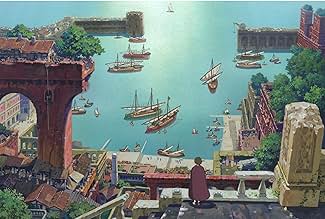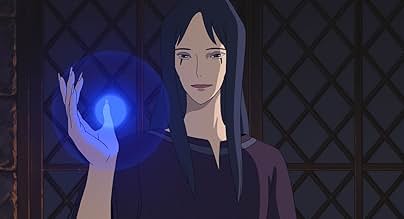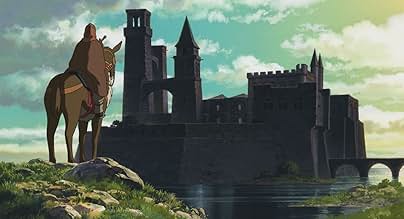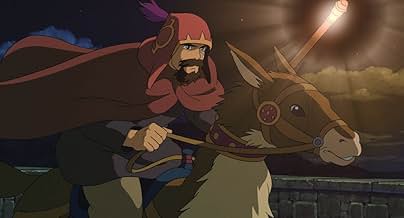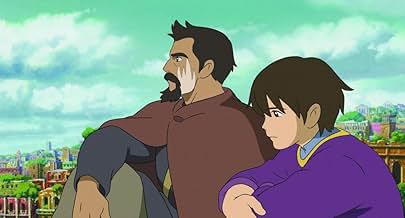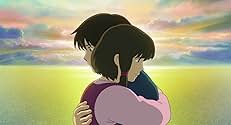IMDb रेटिंग
6.3/10
47 हज़ार
आपकी रेटिंग
एक पौराणिक भूमि में, एक आदमी और एक युवा लड़का असामान्य घटनाओं की एक श्रृंखला की जांच करते हैं।एक पौराणिक भूमि में, एक आदमी और एक युवा लड़का असामान्य घटनाओं की एक श्रृंखला की जांच करते हैं।एक पौराणिक भूमि में, एक आदमी और एक युवा लड़का असामान्य घटनाओं की एक श्रृंखला की जांच करते हैं।
- पुरस्कार
- 3 कुल नामांकन
Timothy Dalton
- Sparrowhawk
- (English version)
- (वॉइस)
Willem Dafoe
- Cob
- (English version)
- (वॉइस)
Mariska Hargitay
- Tenar
- (English version)
- (वॉइस)
Jun'ichi Okada
- Arren
- (वॉइस)
Aoi Teshima
- Theru
- (वॉइस)
Bunta Sugawara
- Haitaka
- (वॉइस)
Yûko Tanaka
- Cob
- (वॉइस)
Teruyuki Kagawa
- Hare
- (वॉइस)
Jun Fubuki
- Tenar
- (वॉइस)
Yui Natsukawa
- The Queen
- (वॉइस)
Kaoru Kobayashi
- The King
- (वॉइस)
Matt Levin
- Arren
- (English version)
- (वॉइस)
Cheech Marin
- Hare
- (English version)
- (वॉइस)
Blaire Restaneo
- Therru
- (English version)
- (वॉइस)
Jeff Bennett
- Additional Voices
- (English version)
- (वॉइस)
Susanne Blakeslee
- The Queen
- (English version)
- (वॉइस)
- (as Suzanne Blakeslee)
फ़ीचर्ड समीक्षाएं
I've just come back from seeing this movie in the cinema. Being a devoted Studio Ghibli fan, going to see one of their movies on the big screen was an exciting event for which I had high expectations (I avoided reading any reviews). I am sorry to say that these were not met.
Having never read any of the books this film is based on, a lot of it didn't make any sense. Most of the concepts and character motivations are not given adequate exposition and a lot of things that you think will be resolved and explained as the movie goes on are never expanded upon (or indeed, resolved). Without giving anything away, the main character commits an outrageous action (especially for Ghibli heroes) at the start of the film, but the motivation for said action is not adequately expanded upon and he never really redeems himself (which makes it very difficult to engage with him for the rest of the film). It nearly felt like I was being punished for not being familiar with the source material.
The middle section is very slow moving, in fact nearly all of the action is to be seen at the beginning and towards the finale. Coupled with the lack of exposition on what's actually going on, it seemed like the film was just treading water, waiting for something interesting to happen (and in a 130 minute film, that's a bad thing!).
The ending, while being emotionally rousing and a spectacular set-piece, doesn't really make a lot of sense, as nearly all of the film focuses on a different protagonist than the one that eventually ends up saving the day.
Technically this film is not a patch on Spirited away, Howl's moving castle or Princess Mononoke, in fact the animation is more reminiscent of earlier Studio Ghibli films, such as Nausicaa (however these had wonderful stories to make them instant classics). The only thing that distinguishes it are the lighting effects, which are often superlative.
The music is great and very atmospheric.
Overall I'd have to say that it's worth watching when it comes out on TV, but not good enough to warrant making a trip to one of few cinemas showing it in the UK, or buying it full price on DVD, and this is something that I never thought I'd hear myself say as a die-hard (and now very disappointed) Studio Ghibli fan.
One final thing, this film has no sense of humour. The movie takes itself overwhelmingly serious with none of the "larger than life" magic that people have come to associate with Studio Ghibli.
Having never read any of the books this film is based on, a lot of it didn't make any sense. Most of the concepts and character motivations are not given adequate exposition and a lot of things that you think will be resolved and explained as the movie goes on are never expanded upon (or indeed, resolved). Without giving anything away, the main character commits an outrageous action (especially for Ghibli heroes) at the start of the film, but the motivation for said action is not adequately expanded upon and he never really redeems himself (which makes it very difficult to engage with him for the rest of the film). It nearly felt like I was being punished for not being familiar with the source material.
The middle section is very slow moving, in fact nearly all of the action is to be seen at the beginning and towards the finale. Coupled with the lack of exposition on what's actually going on, it seemed like the film was just treading water, waiting for something interesting to happen (and in a 130 minute film, that's a bad thing!).
The ending, while being emotionally rousing and a spectacular set-piece, doesn't really make a lot of sense, as nearly all of the film focuses on a different protagonist than the one that eventually ends up saving the day.
Technically this film is not a patch on Spirited away, Howl's moving castle or Princess Mononoke, in fact the animation is more reminiscent of earlier Studio Ghibli films, such as Nausicaa (however these had wonderful stories to make them instant classics). The only thing that distinguishes it are the lighting effects, which are often superlative.
The music is great and very atmospheric.
Overall I'd have to say that it's worth watching when it comes out on TV, but not good enough to warrant making a trip to one of few cinemas showing it in the UK, or buying it full price on DVD, and this is something that I never thought I'd hear myself say as a die-hard (and now very disappointed) Studio Ghibli fan.
One final thing, this film has no sense of humour. The movie takes itself overwhelmingly serious with none of the "larger than life" magic that people have come to associate with Studio Ghibli.
Films experiencing production hell are rarely as good as they might have been, no matter how good the director is (c.f. Gangs of New York and AI) and this one is no exception.
Taken on its own terms, Tales of Earthsea is a competent, if not breathtaking, start for Miyazaki junior, and bears comparison to the lesser Gibli canon without scaling the heights of its major work. It is unfair to compare it to My Cousin Totoro, Spirited Away or Graveyard of the Fireflies; but it is also a shame for the fans of Earthsea. They didn't get a top director at the top of his game.
The principal problem with the film is that it doesn't seem to know what to do with the books it is based on. Are they source material to be pillaged? Are they stories to be adapted? Are they concepts to be explored? In the end Miyazaki opts for a mix: the narrative structure is broadly based on the third novel (The Farthest Shore), with a significant sub-plots from both the first (The Wizard of Earthsea) and the fourth (Tehanu). Into the mix he throws some recognisable manga/anime formulae (the arch-enemy; the ronin henchmen; the violence) which cut across the major themes explored by the novels and alluded to by the film.
If this all sounds like a disaster, it isn't exactly. The plot functions: evil wizard, through pride, upsets the balance of Earthsea forcing archmage, Sparrowhawk, in the company of a young prince, to do battle to restore the balance, destroy the evil and face down their own demons. Had Miyazaki been more ruthless all would probably have been well for anime fans anyway. But there are too many blind alleys, lose ends and needless distractions all nods to the books - which make the first half of the film in particular feel like a second rate brass band meandering painfully around a Brassed Off version of Adagio for Strings. The narcotic Hazia, for example, which dominates the beginning of the third story, is introduced early in the film and then simply abandoned. Later, Tenar's back-story fades into nothingness leaving the audience with a forcible impression of a producer impatiently looking at his watch. The whole effect is not homage, but distraction and a film that it is at least 40minutes longer than it needed to be.
Ursula LeGuin, who wrote the Earthsea novels, had suggested to (Hayao) Miyazaki that he create new story for Ged, uncluttered by her previous stories, set in the many years between the first two books. This would have made for a less ponderous film.
Regarding the technical side of animation; it appears the younger Miyazaki was aiming for the dreamlike quality of animation so characteristic of his father's work. Again, he has some partial success in this regard, although it is undeniably more clunky than other Gibli titles. But a lot can be forgiven for his reliance on hand-drawn animation, and there are some moments of real beauty windblown grasses, rocks on the seashore and chill sunsets. This, along with some strong characters and a much tighter second half, make Tales from Earthsea watchable film, if a slightly underwhelming one. But better than Disney. 6/10
Taken on its own terms, Tales of Earthsea is a competent, if not breathtaking, start for Miyazaki junior, and bears comparison to the lesser Gibli canon without scaling the heights of its major work. It is unfair to compare it to My Cousin Totoro, Spirited Away or Graveyard of the Fireflies; but it is also a shame for the fans of Earthsea. They didn't get a top director at the top of his game.
The principal problem with the film is that it doesn't seem to know what to do with the books it is based on. Are they source material to be pillaged? Are they stories to be adapted? Are they concepts to be explored? In the end Miyazaki opts for a mix: the narrative structure is broadly based on the third novel (The Farthest Shore), with a significant sub-plots from both the first (The Wizard of Earthsea) and the fourth (Tehanu). Into the mix he throws some recognisable manga/anime formulae (the arch-enemy; the ronin henchmen; the violence) which cut across the major themes explored by the novels and alluded to by the film.
If this all sounds like a disaster, it isn't exactly. The plot functions: evil wizard, through pride, upsets the balance of Earthsea forcing archmage, Sparrowhawk, in the company of a young prince, to do battle to restore the balance, destroy the evil and face down their own demons. Had Miyazaki been more ruthless all would probably have been well for anime fans anyway. But there are too many blind alleys, lose ends and needless distractions all nods to the books - which make the first half of the film in particular feel like a second rate brass band meandering painfully around a Brassed Off version of Adagio for Strings. The narcotic Hazia, for example, which dominates the beginning of the third story, is introduced early in the film and then simply abandoned. Later, Tenar's back-story fades into nothingness leaving the audience with a forcible impression of a producer impatiently looking at his watch. The whole effect is not homage, but distraction and a film that it is at least 40minutes longer than it needed to be.
Ursula LeGuin, who wrote the Earthsea novels, had suggested to (Hayao) Miyazaki that he create new story for Ged, uncluttered by her previous stories, set in the many years between the first two books. This would have made for a less ponderous film.
Regarding the technical side of animation; it appears the younger Miyazaki was aiming for the dreamlike quality of animation so characteristic of his father's work. Again, he has some partial success in this regard, although it is undeniably more clunky than other Gibli titles. But a lot can be forgiven for his reliance on hand-drawn animation, and there are some moments of real beauty windblown grasses, rocks on the seashore and chill sunsets. This, along with some strong characters and a much tighter second half, make Tales from Earthsea watchable film, if a slightly underwhelming one. But better than Disney. 6/10
Better than I expected, a fantastic debut from Goro Miyazaki (son of Hayao Miyazaki) and a worthy addition to Ghibli's consistently brilliant catalog. It follows the prince Arren, as he runs from his kingdom and encounters a wizard named Ged. From here, he is drawn into a classic good versus evil battle. Goro Miyazaki's film bares a lot of similarities to his father's films, but lacks some of the whimsical nature that makes Hayao's movies so distinct. Tales from Earthsea is a more subdued film than films such as Spirited Away and Porco Rosso, and doesn't really hit the emotional or imaginative heights that Hayao Miyazaki's films do. But this isn't always a bad thing - It's simply Goro's style, and this element makes his film a more traditional, perhaps more sensible narrative. Goro has taken a somewhat conservative route with this film - visually and audibly it's classic Ghibli, full of lush environments and excellent animation. In terms of narrative, it carries classic Ghibli (particularly Miyazaki) hallmarks - epic battles of good and evil, cathartic journeys, and the hospitality and grace of ordinary people - but it also has more of a traditional narrative. Good and evil are, unlike many his father's films, clearly defined, and the events of the film lack the extravagance (and imagination) of Hayao's films. It's a wise move - rather than try to re-invent the wheel, Goro has made a wonderfully solid and cohesive film.
To simply compare Goro Miyazaki (and his film) to his father is unfair and sells a great movie short - he has obviously inherited a tremendous flair for storytelling, and with Ghibli's animation team behind him, has created a fantastic debut film. There's another Miyazaki in town - and i can't wait to see where he goes next.
To simply compare Goro Miyazaki (and his film) to his father is unfair and sells a great movie short - he has obviously inherited a tremendous flair for storytelling, and with Ghibli's animation team behind him, has created a fantastic debut film. There's another Miyazaki in town - and i can't wait to see where he goes next.
I am a huge fan of both Ursula Le Guin and Studio Ghibli but the story and the presentation just weren't all they needed to be. The fragments of story they excerpted from the novel lacked cohesiveness, so the characters' stories were truncated and lost. The art work was true to the beauty of Ghibli. I'm disappointed that I can only give this film a 6 (fair) out of 10. {Animated Fantasy}
Watching Tales from Earthsea, I felt like I had been dropped off in the middle of a book series with no real context as to what was going on. I enjoyed the beautiful animation and ended up finding interest in the story and characters, but at the end of the film I still felt like I was missing something. Studio Ghibli probably should have set this one up better.
क्या आपको पता है
- ट्रिवियाHayao Miyazaki first wrote to author Ursula K. Le Guin about adapting her book into a film. LeGuin at the time was unfamiliar with Miyazaki's work, and associated animation to be similar to Disney animation, and turned the offer down. After she saw My Neighbour Totoro (1988), she loved it, and decided to allow the movie to be made.
- भाव
Haitaka: Now listen to me, Aaren: No man nor any living thing in this world preserves their life forever. But only to men is it given to know that we must die, and that is a precious gift. This life that is both our torment and our treasure was never meant to endure for eternity. Life is a wave on the sea. Would you force the sea to grow still to save one wave? To save yourself?
- कनेक्शनFeatured in New York, I Love You (2008)
- साउंडट्रैकSong of Time
Lyrics by Akino Arai and Gorô Miyazaki and music by Akino Arai and Hisaaki Hogari
Performed by Aoi Teshima
टॉप पसंद
रेटिंग देने के लिए साइन-इन करें और वैयक्तिकृत सुझावों के लिए वॉचलिस्ट करें
- How long is Tales from Earthsea?Alexa द्वारा संचालित
विवरण
- रिलीज़ की तारीख़
- कंट्री ऑफ़ ओरिजिन
- आधिकारिक साइट
- भाषा
- इस रूप में भी जाना जाता है
- Tales from Earthsea
- उत्पादन कंपनियां
- IMDbPro पर और कंपनी क्रेडिट देखें
बॉक्स ऑफ़िस
- US और कनाडा में सकल
- $48,658
- US और कनाडा में पहले सप्ताह में कुल कमाई
- $20,614
- 15 अग॰ 2010
- दुनिया भर में सकल
- $6,86,73,762
- चलने की अवधि1 घंटा 55 मिनट
- रंग
- ध्वनि मिश्रण
- पक्ष अनुपात
- 1.85 : 1
इस पेज में योगदान दें
किसी बदलाव का सुझाव दें या अनुपलब्ध कॉन्टेंट जोड़ें





